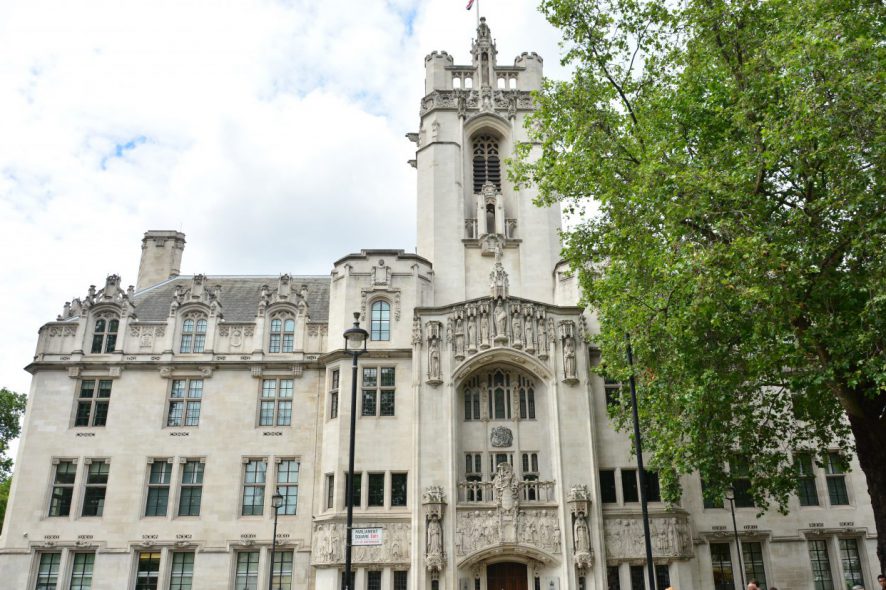Supreme Court of the United Kingdom: While deciding the instant appeal raising questions important to the international market in telecommunications such as –
- Whether a court in the United Kingdom has jurisdiction and may properly exercise a power, without the agreement of both parties to grant an injunction to restrain the infringement of a UK patent where the patented invention is an essential component in an international standard of telecommunications equipment, which is marketed, sold and used worldwide, unless the implementer of the patented invention enters into a global licence of a multinational patent portfolio.
- Whether a UK Court can determine royalty rates and other disputed terms of such a global licence
- The circumstances in which it is appropriate for English court to grant a prohibitory injunction or to award damages.
Answering the aforesaid questions, the Full Bench of Lord Reed, Lord Hodge, Lady Black, Lord Briggs and Lord Sales, JJ., unanimously held that English courts have the power to require telecoms companies and smartphone makers to take out a global patents licence or face a UK Court injunction. It was further observed that the contractual arrangements European Telecommunications Standards Institute (ETSI) has created under its IPR Policy give the English courts jurisdiction to determine the terms of a global license of a multi-national patent portfolio.
The instant matter consisted of 2 appeals which concern actions for infringement of UK patents said to be essential to the implementation of international standards for mobile telephony, such that it is not possible to make, sell, use or operate mobile phones and other equipment that is compliant with the standards without infringing the patents. Patents of this kind are called Standard Essential Patents (SEPs). The international standards in question are those set by the ETSI for 2G (GSM), 3G (UMTS) and 4G (LTE). Under its IPR Policy, ETSI requires the SEP owner to give an irrevocable undertaking to license their patented technology on terms that are “fair, reasonable and non-discriminatory” (FRAND). The first appeal concerns an action brought by Unwired against Huawei for infringement of five UK patents which Unwired claimed to be SEPs. The second appeal concerns an action brought by Conversant against Huawei and ZTE for infringement of four of its UK patents.
Acknowledging the importance of the issues raised in the instant appeal vis-à-vis international market in telecommunications, the Full Court meticulously addressed the questions-
- Regarding Jurisdiction and Forum Conveniens – It was contended that properly construed, ETSI’s IPR Policy only permits the English courts to determine the terms of a license of UK SEPs. Dismissing the contention, the Bench held that English courts have jurisdiction and may properly exercise their powers of granting injunctions etc. Questions as to the validity and infringement of a national patent fall to be determined by the courts of the state which has granted the patent. It was observed that the IPR Policy envisages 2 things namely- the courts may decide whether or not the terms of an offered licence are FRAND and that the courts should look to and draw on commercial practice in the real world while making this assessment. Regarding the issue of proper Forum, the Court noted that Chinese courts currently do not have the jurisdiction needed to determine the terms of a global FRAND licence, unless all parties agree that they should do so.
- Regarding Royalty- upon perusing the contention that Unwired should have offered Huawei a licence with a worldwide royalty rate because non-discrimination limb of the FRAND undertaking means that ‘like situations must be treated alike and different situations differently’, the Court observed that non-discriminatory part of the undertaking indicates that, to qualify as FRAND, a single royalty price list should be available to all market participants. This must be based on the market value of the patent portfolio, without adjustment for the characteristics of individual licensees.
- Regarding Injunctions and Damages- it was contended by Huawei that, even if it is infringing Unwired and Conversant’s SEPs, the more appropriate and proportionate remedy would be for the Court to award the claimants damages. Rejecting the argument, the Bench held that an award of damages would not be an adequate substitute for an injunction. It was observed that there is no risk that Unwired or Conversant could use the threat of an injunction as a means of charging exorbitant fees, since they cannot enforce their rights unless they have offered to license their SEPs on terms which the Court is satisfied are FRAND.
[Unwired Planet International Ltd. v. Huawei Technologies (UK) Co Ltd., 2020 Bus LR 2422, decided on 26-08-2020]
Sucheta Sarkar, Editorial Assistant has put this story together







